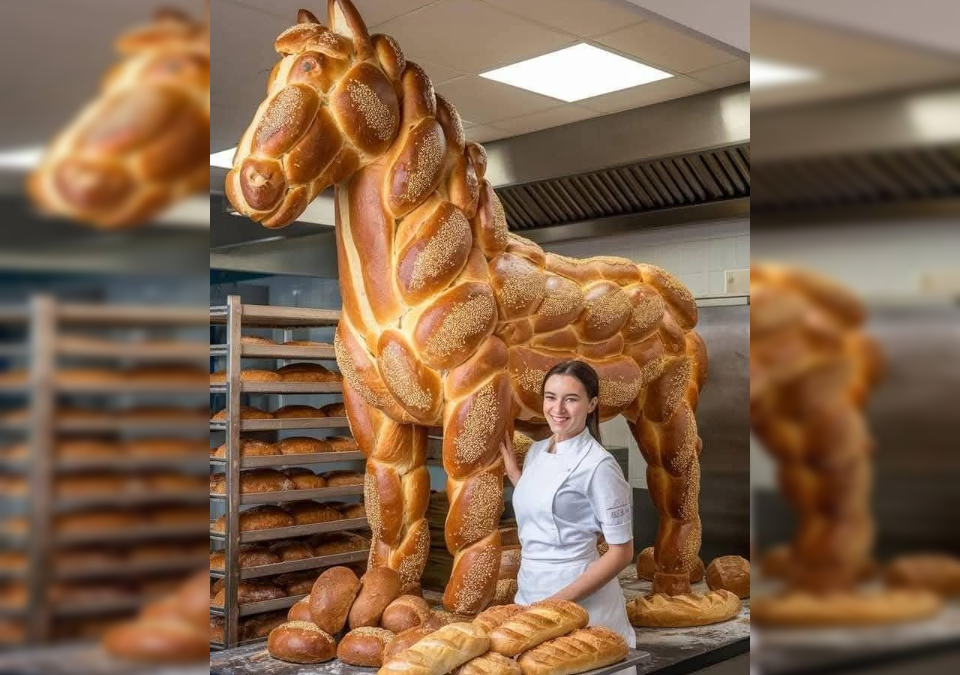Keep our news free from ads and paywalls by making a donation to support our work!

Notes from Poland is run by a small editorial team and is published by an independent, non-profit foundation that is funded through donations from our readers. We cannot do what we do without your support.
An AI-generated image of a woman proudly showing off a horse-shaped bread she has supposedly baked has become a hit among Polish internet users after some people mistakenly took it to be real.
The picture quickly became a meme, but has also been used as a warning of how it is becoming increasingly easy to fool vulnerable people into thinking AI-generated images are genuine.
Last week, a popular satirical social media account, Polska w dużych dawkach (meaning “Poland in large doses”), first shared the image showing a woman who had allegedly made the horse from challah, a bread historically associated with Jewish cuisine but which is widely eaten in Poland.
“This woman baked a challahorse [chałkoń] but no one congratulated her,” read Polska w dużych dawkach’s post on Facebook, where it quickly reached over a million users and attracted 11,000 reactions and 1,500 comments. It was also widely shared on other accounts.
The challahorse’s popularity stemmed in part from the fact that some users appeared to believe it was real, writing comments congratulating the baker.
In a follow-up post, Polska w dużych dawkach shared examples of such comments and explained the intention behind the original post. “For some time now, Facebook has been flooded with generic AI content aimed at older and slightly more naive people,” they wrote.
“The text ‘someone did X but no one congratulated them’ has basically become a meme and is present under almost every such post, because it somehow motivates people to leave comments, and thus increase traffic to the site.”
Polska w dużych dawkach said that they had decided to do something similar for fun, “but the challahorse turned out to be a beast whose power we underestimated”.
Then, more seriously, they wrote that, with AI-generated graphics becoming ever more realistic, “things will only get worse”. Such images can be used to target and trick certain groups, such as the elderly.
“Talk to your family, make them aware that not every photo on the internet is real, which has always been true but, due to the development of AI, the issue has gained enormous momentum,” they concluded.
In the meantime, however, the challahorse has taken on a life of its own, spawning countless internet memes and other jokes, including supposed recipes for how to bake your own one.
A number of users also began generating images of other objects made from challah, including businesses who used it as an opportunity for viral advertising.
Among them was the Polish branch of Swedish furniture giant IKEA. “We baked a cinnamon bun armchair but no one congratulated us because they were busy eating it,” wrote the firm on Facebook.
Meanwhile, a bakery in the city of Gdynia decided to go one better than AI and made an actual challah in the shape of a crocodile.
“Kacper baked a challahcrocodile and he’s sad because no one congratulated him yet,” wrote the Chlebostacja bakery in a social media post that has over 15,000 reactions on Facebook.
“Warning: this photo is not generated by AI,” they added. “P.S. In the age of artificial intelligence, be vigilant and pay attention to content posted on the internet.”

Notes from Poland is run by a small editorial team and published by an independent, non-profit foundation that is funded through donations from our readers. We cannot do what we do without your support.
Main image credit: Polska w dużych dawkach/Facebook

Daniel Tilles is editor-in-chief of Notes from Poland. He has written on Polish affairs for a wide range of publications, including Foreign Policy, POLITICO Europe, EUobserver and Dziennik Gazeta Prawna.



















